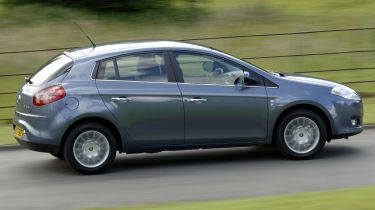Fiat Bravo Multijet 150 Dynamic
Does the new Italian hatch deliver on the promise of its stylish looks?
Bosses admit that the Bravo is a critical car for Fiat. Ultimately, the firm wants to rival Toyota and VW when it comes to quality, but is also keen to build on its own strengths – namely style and driver enjoyment. It’s serious about succeeding in the UK, too, and is aiming to generate annual sales of 100,000 cars by 2010 – an ambition shared by Kia.
Yet the Italian brand has a smaller range than its Korean rival, and the Bravo’s success will be crucial if it wants to achieve its targets. First impressions are positive. Designers are obviously keen to follow on from the success of the Grande Punto and build on its strengths, so it’s no surprise that the Bravo looks like an enlarged version of the supermini, particularly at the front.
Viewed in profile, it has an athletic wedge shape, thanks to the rising waistline and arching roof – it’s aggressive and is helped by the sweeping headlights and Maserati-style grille, while the rear, with its characteristic tail-lights, completes the look. From this angle, it also has echoes of the previous Bravo, axed in 2001.
Style is now a crucial factor in most buyers’ vehicle choice, and the new car certainly ticks this box. The trouble is, there has always been a question mark over quality when it comes to Fiat – particularly in terms of the cabin. We are pleased to report that the company has obviously been working hard to rectify this.
Gone are the bland and scratchy plastics, to be replaced by a pleasant combination of soft-touch materials and well damped switchgear. Look closely and you will find areas where the plastics feel average. Still, it’s easily the best offering from Fiat to date, and although it’s difficult to predict what it will be like after three years, everything seems fairly robust and well finished.
The dash layout is good, the heater and stereo controls logical, while the deep-set instrument dials add an upmarket touch. It’s a shame, then, that the driving position is set a tad too high – the seat could do with adjusting lower, and also lacks under-thigh support. Rear passenger space isn’t great, either – although the Bravo is the longest car here, it’s quite cramped in the back, and headroom is limited, too.
Once on the move, though, it’s clear that the 1.9-litre Multijet engine is a real gem. It’s quiet on start-up and there’s minimal vibration through the cabin, but it has plenty of punch, with 90 per cent of the 305Nm of torque available from 1,750rpm. Power delivery is smooth and predictable, unlike in the Leon, and with a 37bhp advantage over the Kia, the Fiat was quickest at the test track, sprinting from 0-60mph in 8.7 seconds. In-gear acceleration was also the strongest.
Ride quality is good, albeit firm and slightly crashy on rough surfaces, but the trade-off is decent body control through bends. The Bravo is agile, with plenty of grip, and turns in well. It’s just a shame that the package is spoiled by the overly assisted Dualdrive electric power-steering, which is too light and lacks feel. Ultimately, this saps any real sense of driver involvement, and leaves the Fiat disappointingly numb.
In this company, the Bravo is also expensive; it carries a £950 premium over the Kia. We were unable to get hold of a lower-output 120bhp diesel for our test, but specifying this engine, which is still more powerful than the three contenders here, would lower the list price to £14,395 – making the Fiat even more competitive.
Details
Price: £15,195
Model tested: Fiat Bravo Multijet Dynamic
Chart position: 1
WHY: New hatch aims to banish memories of Fiat’s lacklustre Stilo; early impressions are favourable.
Economy
As it has the most power and torque in our test, it’s no surprise that the Fiat is the least economical, with a 41.0mpg average. This means it has the shortest range, at only 523 miles.
Residuals
Used values for the Bravo haven’t been calculated yet as it’s too new. However, Fiat will hope for better than the Stilo, which retains only 29.7 per cent of its original value.
Servicing
Dealers have yet to release Bravo service prices. But we do know that Fiat’s network has a poor reputation – you voted it 31st out of 32 in our Driver Power 2007 survey.
Tax
Fiat’s 1.9-litre Multijet is the dirtiest engine on test, putting the Bravo one tax bracket above its rivals. But the low price tag means it’s not the most costly fleet choice.







